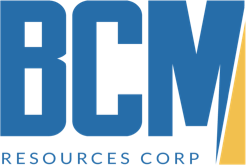Vancouver, BC, June 9, 2022 – BCM Resources Corp (Company) is informing its shareholders that the Company successfully completed the (6) holes (15,850ft or 4,831m) in its Phase II exploration drilling at its Thompson Knolls (TK) Cu-Au-Mo porphyry project in the southwestern part of Utah, USA. TK is located approximately 225 km southwest of Rio Tinto’s giant Bingham Canyon porphyry Cu-Mo-Au mine and smelter complex near Salt Lake City, Utah.
The overall Phase I & II programs have involved seven (7) drill holes for 16,968ft (5,172m).
Highlights from Phase II drilling:
Drillholes TK3a and TK6 are the deepest holes drilled to date, extending to 3,653ft (1,113m) and 3,930ft (1,198m) depths respectively and having the most extensive mineralization documented. TK6 assay results are pending and will be reported with all analytical results for Phase II drilling.
- Hole TK3a intercepted Cu-Mo mineralization, stretching for 1,853ft (565m) as part of an intrusive stockwork and veinlets porphyry system within the zone of sericitic alteration in quartz-monzonite porphyry intrusion with local zones of potassic alteration.
- Hole TK6 discovered a significant extent of skarn mineralization stretching for over 946ft (288m) with Mo-Au-Cu mineralization (drill hole was stopped in the skarn due to equipment failure). Visual chalcopyrite mineralization in the skarn appears to be directly correlated with the amount of magnetite (https://bcmresources.com/site/assets/files/5930/2022-06-09-bcm-nrcp.pdf)
President Dr. Sergei Diakov stated, “Significant copper-gold mineralization intersected in hole TK6 is critically important for the Thompson Knolls project as it obviously indicates project’s potential for presence of significant copper porphyry system with mineralization hosted by both mineralized intrusion and the skarns around it.”
Processing and synthesis of geological and geophysical data is underway - this compilation of data will be critical for designing the Phase III exploration drill program that will be focused on continuing search of the TK porphyry system copper core in the mineralized quartz-monzonite intrusion testing central and eastern part of the magnetic high anomaly. Phase III is expected to start in 4Q22 once additional exploration drilling permits are secured.
The Company’s Director, Mr. Richard R. Redfern, M.Sc., and Certified Professional Geologist, a 'qualified person' for the purposes of National Instrument 43-101, has verified and approved the information contained in this news release.
About BCM Resources Corporation
BCM Resources Corporation is a diversified Canadian mineral exploration company focused on continued exploration of the Thompson Knolls Porphyry Cu-Au-Mo project. BCM also controls prospective Copper, Gold, and Molybdenum exploration projects in British Columbia. BCM Resources is managed by experienced and successful board members and advisors. For further information, including area maps, sections, and photos, please visit our website at www.bcmresources.com or contact us by e-mail at info@bcmresources.com.
ON BEHALF OF BCM RESOURCES CORP.
Sergei Diakov
President & Director
For further information, please contact:
Investor relations 604-646-0144 ext. 222
info@bcmresources.com
www.bcmresources.com
Caution Concerning Forward-Looking Statements:
This news release and related texts and images on BCM Resource Corporation’s website contain certain “forward-looking statements” including, but not limited to, statements relating to interpretation of mineralization potential, drilling and assay results, future exploration work, and the anticipated results of this work. Forward-looking statements are statements that are not historical facts and are subject to a variety of risks and uncertainties which could cause actual events or results to differ materially from those reflected in the forward-looking statements, including, without limitation: risks related to fluctuations in metals prices; uncertainties related to raising sufficient financing to fund the planned work in a timely manner and on acceptable terms; changes in planned work resulting from weather, logistical, technical, governmental, social, or other factors; the possibility that results of work will not fulfill expectations and realize the perceived potential of the company’s projects; uncertainties involved in the interpretation of sampling and drilling results and other tests; the possibility that required permits and access agreements may not be obtained in a timely manner; risk of accidents, equipment breakdowns or other unanticipated difficulties or interruptions, and; the possibility of cost overruns or unanticipated expenses in these exploration programs.

